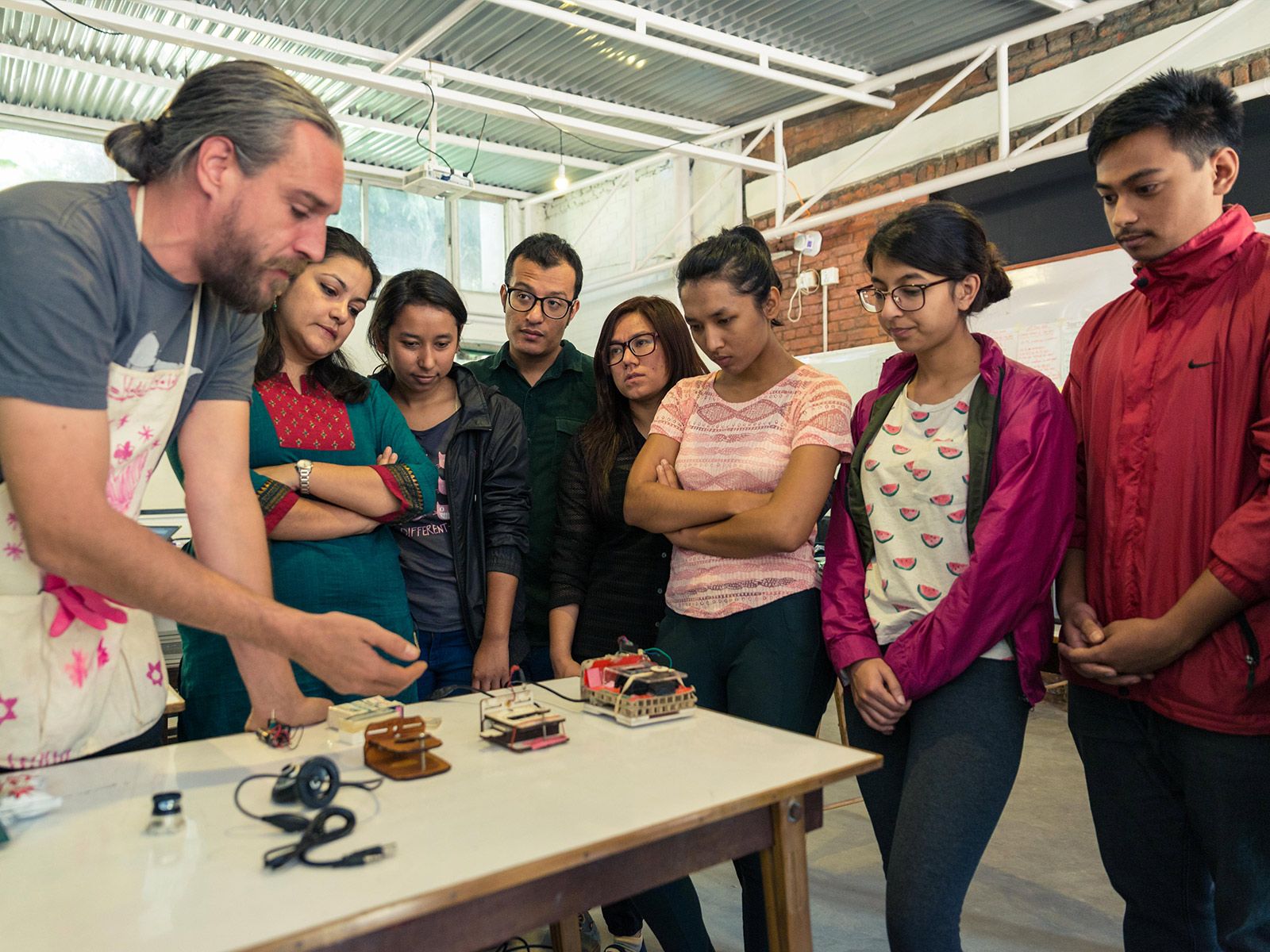Our Approach
Co-creation
Karkhana Samuha (KS) practices participatory decision making and co-designing by bringing together partners, collaborators and end users. KS uses Design Thinking (DT) and Human Centered Design (HCD) as its core project design and management methodology.These operational models are proven by academic literature and experience to lead to more innovative ideas and provide meaningful voice to the intended end-users. To operationalize co-creation, KS works through participatory, collaborative and iterative methods to identify potential solutions. In strengthening this approach, KS also works on building communities of practice which are created deliberately with the goal of gaining, sharing and implementing knowledge to innovate locally and make a global impact.

Adaptive Management
KS uses the Result Based Management (RBM) approach to define project impacts, outcomes, outputs and corresponding indicators such that there are clear linkages enabling a process for the effective and efficient allocation of project resources. The RBM approach not only allows for the conceptualization and development of project strategies but also allows for their monitoring and evaluation. This enables a learning strategy and paves the way for the implementation of adaptive management based on immediate changes in the project environment.
KS’s own design thinking approach TMPI, which stands for Think Make Play Improve, is an adaptive, non-linear, iterative, and learning oriented approach to management. Applying the TMPI philosophy, KS approaches its work as a series of cycles where planning occurs (Think), action is initiated (Make), activities are conducted in partnership with others, (Play) and a reflection phase where insights are generated/learnings are realized (Improve). After the Improve phase, the project begins another TMPI cycle starting at a Think phase. TMPI is thus a non-linear iterative approach to management that has built in opportunities to gather information about the environment at a given time i.e., is context aware, to reflect on one’s actions and generate insights about them i.e. enables learning, and to adjust one’s behaviors based on changes in the context and new insights i.e. is adaptive.
KS’s own design thinking approach TMPI, which stands for Think Make Play Improve, is an adaptive, non-linear, iterative, and learning oriented approach to management. Applying the TMPI philosophy, KS approaches its work as a series of cycles where planning occurs (Think), action is initiated (Make), activities are conducted in partnership with others, (Play) and a reflection phase where insights are generated/learnings are realized (Improve). After the Improve phase, the project begins another TMPI cycle starting at a Think phase. TMPI is thus a non-linear iterative approach to management that has built in opportunities to gather information about the environment at a given time i.e., is context aware, to reflect on one’s actions and generate insights about them i.e. enables learning, and to adjust one’s behaviors based on changes in the context and new insights i.e. is adaptive.
Policy Coordination
Karkhana Samuha (KS) and it’s leadership are deeply engaged with shaping and providing input into policy in the education and innovation spaces. Our team members have served as experts on several Ministry of Education, Science, and Technology (MoEST) constituted committees.These include the Committee on Implementing STEAM Education as well as the SubCommission on Education, Pedagogy and Alternatives in response to COVID-19 where the whitepaper produced by a KS team member served as the basis of the national education policy response.
The KS team also serve on the curriculum committee for the Kathmandu University School of Education, as a Civilian Expert on the Assessment Committee of the national Military Science Technology Competition conducted by the Nepal Army, and on the Science Education Advisory Committee of the National Academy of Science and Technology (NAST). As a member of the Local Education Group (LEG), KS is actively involved in coordinating and representing the voice of Civil Society Organizations (CSO) in policy processes.
Given it’s unique position as a bridge between peripheral but innovative and creative stakeholder and the education policy establishment, KS makes a special effort to represent alternative voices and ideas in the established policy processes.
The KS team also serve on the curriculum committee for the Kathmandu University School of Education, as a Civilian Expert on the Assessment Committee of the national Military Science Technology Competition conducted by the Nepal Army, and on the Science Education Advisory Committee of the National Academy of Science and Technology (NAST). As a member of the Local Education Group (LEG), KS is actively involved in coordinating and representing the voice of Civil Society Organizations (CSO) in policy processes.
Given it’s unique position as a bridge between peripheral but innovative and creative stakeholder and the education policy establishment, KS makes a special effort to represent alternative voices and ideas in the established policy processes.